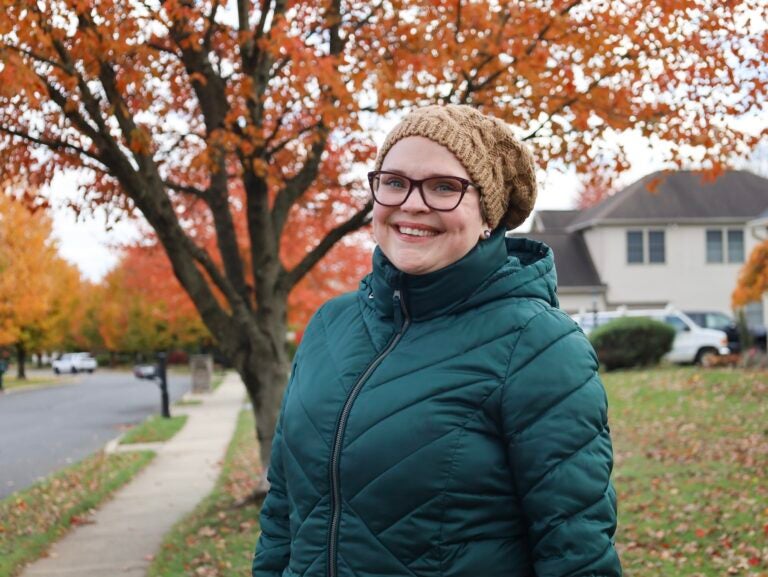Health
New Nonhormonal Menopause Drug Offers Hope for Cancer Survivors

A newly approved nonhormonal drug, elinzanetant, branded as Lynkuet, is set to provide significant relief for women experiencing menopause symptoms, particularly those who are cancer survivors. The U.S. Food and Drug Administration (FDA) approved the medication last month, expanding treatment options for individuals who cannot use traditional hormone therapies due to their medical histories.
Charlotte Safrit, a 47-year-old cancer survivor from Allentown, Pennsylvania, began facing intense menopause symptoms, including hot flashes and night sweats, after undergoing a double mastectomy, chemotherapy, and radiation for triple-positive breast cancer. “I was talking to my oncologist one day and I was like, ‘Sometimes I just get really sweaty all of a sudden and I don’t know why,’” she recalled. It was a moment of realization for Safrit as she recognized these symptoms as early signs of menopause, which can occur prematurely in women after cancer treatments.
The natural onset of menopause typically occurs between the ages of 45 and 55, yet cancer treatments can accelerate this process. For women like Safrit, hormone therapies are often not an option due to the risks associated with hormone-positive cancers. With this in mind, the introduction of Lynkuet offers a much-needed alternative.
Mechanism and Availability of Lynkuet
Lynkuet operates by targeting neuron receptors in the brain that regulate temperature, effectively blocking hot flashes and night sweats without utilizing hormone pathways common in other medications. This novel approach could significantly change the management of menopause symptoms for many women.
According to pharmaceutical manufacturer Bayer, Lynkuet is expected to be available to patients and providers starting this month. The potential impact of this drug has generated excitement among healthcare professionals. Dr. Elizabeth Clement, medical director of the Helen O. Dickens Center for Women’s Health at Penn Medicine, emphasized the historical lack of effective nonhormonal options for menopause management. “After decades of disinvestment in women’s health, to see medications coming to market that are helpful for our patients is very exciting,” she stated.
Addressing a Critical Gap in Women’s Health
Menopause symptoms can be disruptive, affecting sleep, mood, cognition, and overall quality of life. Dr. Julia Switzer, program director of obstetrics and gynecology residency at Thomas Jefferson University, highlighted the significance of Lynkuet’s development. Traditional hormone therapies have proven effective but are unsuitable for many women with hormone-sensitive conditions or histories of blood clots and strokes.
Alternative treatments, such as antidepressants or anticonvulsants, have been used for menopause symptoms but often lack the effectiveness many patients seek. The arrival of Lynkuet represents a critical advancement in care, empowering healthcare providers to offer more comprehensive treatment options. “It really makes you feel like you can make your toolbox bigger and provide a treatment that would be effective for almost every patient that you see,” Switzer said.
For survivors like Safrit, the introduction of this drug is not just a medical breakthrough; it symbolizes hope and a renewed focus on women’s health. As she navigates her new reality post-cancer, Safrit has become an advocate for awareness regarding the long-term effects of survivorship, including menopause.
“I call it my superpower,” Safrit said, referring to her willingness to share her experiences. “People are afraid to talk about it, but when I share, they feel comfortable opening up about the weird things happening in their bodies.”
As Lynkuet emerges on the market, it underscores the importance of continued investment in treatments that address the unique needs of women, particularly those navigating the complexities of menopause after cancer. With this new option, many women may find a much-needed ally in managing their symptoms and improving their overall well-being.
-

 Top Stories2 weeks ago
Top Stories2 weeks agoMarc Buoniconti’s Legacy: 40 Years Later, Lives Transformed
-

 Sports3 weeks ago
Sports3 weeks agoSteve Kerr Supports Jonathan Kuminga After Ejection in Preseason Game
-

 Science3 weeks ago
Science3 weeks agoChicago’s Viral ‘Rat Hole’ Likely Created by Squirrel, Study Reveals
-

 Politics3 weeks ago
Politics3 weeks agoDallin H. Oaks Assumes Leadership of Latter-day Saints Church
-

 Entertainment3 weeks ago
Entertainment3 weeks agoZoe Saldana Advocates for James Cameron’s Avatar Documentary
-

 Business3 weeks ago
Business3 weeks agoTyler Technologies Set to Reveal Q3 2025 Earnings on October 22
-

 Lifestyle3 weeks ago
Lifestyle3 weeks agoKelsea Ballerini Launches ‘Burn the Baggage’ Candle with Ranger Station
-

 Lifestyle3 weeks ago
Lifestyle3 weeks agoDua Lipa Celebrates Passing GCSE Spanish During World Tour
-

 Sports3 weeks ago
Sports3 weeks agoPatriots Dominate Picks as Raiders Fall in Season Opener
-

 Health3 weeks ago
Health3 weeks agoCommunity Unites for Seventh Annual Mental Health Awareness Walk
-

 World3 weeks ago
World3 weeks agoD’Angelo, Iconic R&B Singer, Dies at 51 After Cancer Battle
-

 Business3 weeks ago
Business3 weeks agoMLB Qualifying Offer Jumps to $22.02 Million for 2024









